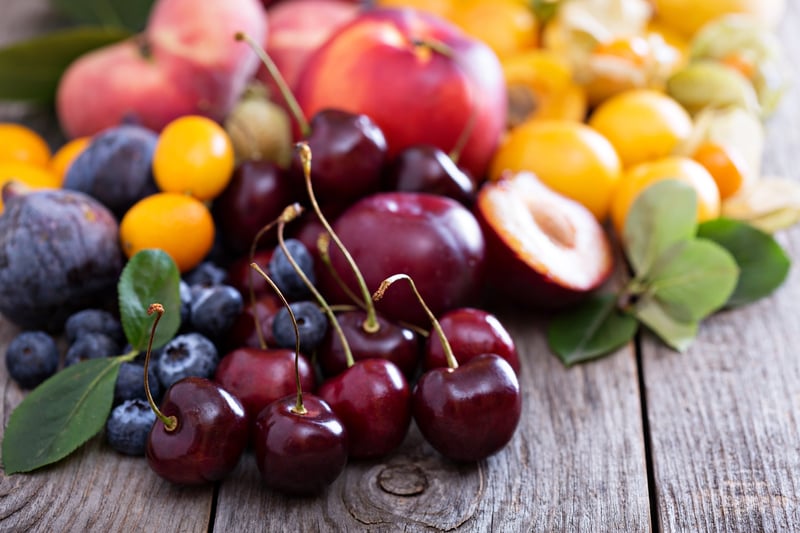These 17 Stone Fruits Have Big Health Benefits (See the List)

Peaches, mangos, cherries, oh my! Some of our favorite fruits are known as stone fruits or drupes. That is, fruits with a large seed or pit surrounded by sweet, juicy, delicious fruit encased in a thin skin (usually) that’s easy to sink your teeth into. Stone fruits are perhaps more popular during the early spring and summer months when they’re in season, but many freeze well, so you can enjoy the benefits of stone fruits year-round.
The list of popular stone fruits includes:
- Peaches
- Plums
- Apricots
- Mangoes
- Cherries
- Dates
- Nectarines
Surprising drupes include coconuts, lychees, green almonds, raspberries, blackberries, mulberries (which are also known as drupelets due to their cluster of tiny stone fruits), and even olives. Really!
Finally, there are hybrid stone fruits that have gained popularity like:
- Pluots (plum + apricot that lean more toward a plumy flavor)
- Apriums (apricot + plum that has more of an apricot flavor)
- Plumcots (which are half and half between the flavors of apricots + plums)
How to Choose Stone Fruits
It’s more difficult to find the rich, juicy stone fruits during fall and winter. But if you do spot them in your local grocery store, look for fruit that’s slightly soft and avoid fruits with green skin. For example, ripe mango skin goes from more greenish to orange or red.
You’ll also want to ensure the fruit is still firm to the touch. Stone fruits can ripen quickly and then become too mushy. But don’t shy away from a few small bruises, which are common in perfectly ripe fruit and can indicate sweeter, more juicy fruit. Harder, bruise-less fruit may not be quite ripe and therefore lack the flavor and sweetness you’re searching for. A delicious aroma may be an even better indicator of when the fruit is ready to eat.
Look for stone fruit season to begin in the late spring with cherries, apricots, and plums and to continue through summer and even into fall with mangos, peaches, nectarines, and plums, which enjoy a longer growing season than other stone fruits.
To help the fruits stay at their best, keep them on the counter until they’re ripe. Once ripe, if you haven’t eaten them yet, transfer them to the fridge to help extend “shelf life” and prevent them from overripening. Cherries are one exception. They can go straight into the fridge.
Health Benefits of Stone Fruits
Like most fruits, stone fruits offer an array of nutrients, including vitamins A, C, E, and K, along with fiber, potassium, calcium, and loads of antioxidants. They’re also low in calories, with an average of only 67 calories per cup, with some coming in lower (e.g., plums) and others higher (e.g., mangos). Whether you’re adding them to smoothies, salads, desserts, or just on their own, they’re a healthy addition to just about any diet.
Let’s count the ways stone fruits may help support overall health:
1. Support immunity
With a good dose of antioxidants, including vitamin C, flavonoids, and anthocyanins, stone fruits may help your body build a stronger immune system to battle against infections, inflammation, and oxidative stress.
2. Boost collagen
Again due to their rich vitamin C content, stone fruits may help boost collagen production to help keep the skin soft, smooth, and supple. A single cup serving of plums or apricots provides about one-fourth of your daily vitamin C needs.
3. Promote healthy digestion
An excellent source of healthy fiber, stone fruits of all varieties can help keep the intestine running more smoothly and regularly. What’s more, ensuring you get enough fiber helps promote blood sugar control, lower blood pressure, and support healthy cholesterol levels. It may also help protect against digestive issues like acid reflux and constipation.
4. Promote a healthy weight
Because stone fruits are high in fiber and low in calories, they provide double the benefit when it comes to supporting a healthy weight. Fiber, for example, helps you feel fuller for longer, decreasing appetite, so you eat less. With its positive effect on gut health and its nutrient density, stone fruits fit well into just about any type of weight-loss diet.
5. Reduce the risk of diabetes and obesity
Metabolic syndrome is a condition caused by obesity and inflammation that can lead to diabetes, heart disease, and other conditions. Because stone fruits are so high in a wide range of nutrients, they may help decrease the risk.
6. Support eye health
Vibrant orange fruits and vegetables tend to be high in antioxidants and polyphenols, including carotenoids. And apricots, nectarines, and peaches are no exception. Carotenoids are antioxidants that have been shown to help support eye health along with skin health and immune function. Because carotenoids appear to be even more readily available when the fruit is cooked, consider poaching or grilling peaches or nectarines or baking apricots for a tasty, healthy dessert.
7. Support strong bones and teeth
Stone fruits are also high in vitamin K, an overlooked nutrient that plays an important role in healthy teeth and bones as well as blood clotting. Two tasty plums can provide about a tenth of your daily K needs, which is needed to help prevent bone loss and help protect against bone fractures.
8. Support sleep
If you’re looking for a late-night snack that will help you sleep, a handful of sweet cherries fit the bill. They’re a natural source of melatonin, a nutrient known to help support sleep.
Benefits of Stone Fruits: A Recap
Stone fruits are worth adding to your diet simply due to their sweet, juicy goodness, but add in all of the health effects, and it becomes a no-brainer. Some simple ways to eat and enjoy the benefits of stone fruits more are to:
- Toss a handful of fresh or frozen fruit into a smoothie or protein shake
- Add chopped fruit into a bowl of oatmeal or mixed into some overnight oats
- Stir diced fruit into a bowl of Greek yogurt
- Top a fish or chicken dish with fresh grilled peaches or apricots
- Marinate chicken or pork chops with a blend of plums, peaches, or tart cherries
- Top fish tacos with a fruit salsa—choose peach, mango, apricots, cherries, plums, or a mix
- Sliced on top of salads
- Add a splash of tart cherry juice or some sliced fresh fruit to a glass of ice water or seltzer
- Bake them into a no-sugar-added pie or tart, or sweetened with a natural low-calorie sweetener like stevia or monk fruit
- Enjoy!




 7 Signs Your Body is Seriously Low on Collagen (not just wrinkles)
7 Signs Your Body is Seriously Low on Collagen (not just wrinkles) Health Expert: "Turmeric Doesn't Work (unless...)"
Health Expert: "Turmeric Doesn't Work (unless...)" 3 Warning Signs Your Probiotic Supplement is a Total Waste
3 Warning Signs Your Probiotic Supplement is a Total Waste

